2016 江苏南京航空航天大学英语考研真题
I. Vocabulary and Structure (20 points)
Directions: There are 20 incomplete sentences in this part. For each sentence there
are fourchoices marked A., B., C. and D. Choose the ONE answer that best completes
the sentence.
1. I would like to have a talk with him _____ his convenience.
A. in B. at C. for D. with
2. I'd rather you _____ those important documents with you.
A. don't take B. didn't take C. won't take D. not take
3. If a couple are divorced and their child lives with his mother, he is said to
suffer from lack of _____ love.
A. maternal B. fraternal C. paternal D. parental
4. If English is not our first language you can often be puzzled by ways of expression
that the native speaker of English does not even have to _____.
A. think out B. think about C. think over D. think for
5. If it _____ too much trouble, I'd love a cup of tea.
A. isn't B. wasn't C. weren't D. hadn't been
6. If the fire alarm is sounded, all residents are requested to _____ in the
courtyard.
A. converge B. assemble C. crowd D. accumulate
7. If the United States had built more homes for poor people in 1995, the housing
problems now in some parts of the country _____ so serious.
A. wouldn't be B. wouldn't have been C. will not be D. would have not been
8. If Tom wins tomorrow, he _____ thirty races in the past four years.
A. will win B. has won C. would have won D. will have won
9. If we believe something is good and true we should _____ to it.
A. hold up B. keep on C. hold on D. keep up
10. If you _____ James, ask him to phone me.
A. should see B. must see C. might see D. would see
11. If you are required to do some work, it must be done _____.
A. sooner or later B. after all others C. at last D. in the long run
12. If you know what the trouble is, why you don't help them to _____ the situation?
A. simplify B. modify C. verify D. rectify
13. I'm sorry, but what he thinks is not of the _____ important to me.
A. worthy B. valuable C. valueless D. priceless
14. I'm sure your suggestion will _____ the problem.
A. contribute to solving B. be contributed to solve
C. contribute to solve D. be contributed to solving
15. I'm very much obliged to you _____ the information.
A. on B. for C. with D. of
16. In American universities, classes are often arranged in more flexible _____ and
many jobs on campus are reserves for students.
A. scales B. ranks C. grades D. patterns
�
17. In Beijing, the season of the year is probably _____ fall.
A. later B. last C. latter D. late
18. In spite of the wide range of reading material specially written or ______ for
language learning purposes,there is yet no comprehensive systematic program for the
reading skills.
A. adapted B. acknowledged C. assembled D. appointed
19. In that country, guests tend to feel they are not highly _____ if the invitation
to a dinner party is extended only three or four days before the party date.
A. admired B. regarded C. expected D. worshipped
20. In that country, students will be _____ admittance to their classroom if they
are not properly dressed.
A. declined B. deprived C. denied D. deserted
II. Reading Comprehension (30 points)
Directions: There are 4 passages in this part. For each of them there are four choices
marked A.,B., C. and D. You should decide on the best choice.
Passage 1
A study of art history might be a good way to learn more about a culture than that
is possible to learn in general history classes. Most typical history courses
concentrate on politics, economics, and war. But art history focuses on much more
than this because art reflects not only the political values of a people, but also
religious beliefs, emotions, and psychology. In addition, information about the
daily activities of our ancestors--- or of people very different from our own ---
can be provided by art. In short, art expresses the essential qualities of a
time and a place, and a study of it clearly offers us a deeper understanding than
that can be found in most history books.
In history books, objective information about the political life of a country is
presented; that is, facts about politics are given, but opinions are not expressed.
Art, on the other hand, is subjective: it reflects emotions and opinions. The great
Spanish painter Francisco Goya was perhaps the first truly “political” artist.
In his well-known painting The Third of May 1808, he criticized the Spanish
government for its misuse of power over people. Over a hundred years later, symbolic
images were used in Pablo Picasso’s Guernica to express the horror of war. Meanwhile,
on another continent, the powerful paintings of Diego Rivera, Jose Clemente
Orozco, and David Alfaro Siqueiros --- as well as the works of Alfredo Ramos Martines
--- depicted these Mexican artists’ deep anger and sadness about social problems.
In the same way, art can reflect a culture’s religious beliefs. For hundreds of
years in Europe, religious art was almost the only type of art that existed. Churches
and other religious buildings were filled with paintings that depicted people and
stories from the Bible. Although most people couldn’t read, they could still
understand biblical stories in the pictures on church walls. By contrast, one of
the main characteristics of art in the Middle East was (and still is ) its absence
of human and animal images. This reflects the Islamic (伊斯兰教的) belief
that statues are unholy (不神圣的).
21. From passage One, we know that ______.
�
A. art history reveals a people’s religious and emotional life as well as its
political views and psychology
B. general history provides us with information about everyday life of ancient people
C. general history gives us an insight into the basic situations of a time and a
place
D. art history regards politics as an unworthy topic
22. Art is subjective in that it _____.
A. records what people felt and thought at a particular time
B. expresses the essential qualities of a time and a place
C. often gives us a better understanding of our history
D. often presents the subjective message about the political life of a country
23. It may be concluded from this passage that _____.
A. Islamic artists painted images on church walls as a way of teaching
B. war was not one of the topics art history addressed
C. Europeans respected images of biblical figures
D. for some time in Europe, art was the only way to understand religion
24. According to the passage, what can be usually found in a truly “political”
artist’s work?
A. His criticism to the religious beliefs of his country.
B. His explanation about the political values of his country.
C. His dissatisfaction to wars, his government or social problems.
D. His concern about the daily life of the poor in his country.
25. The passage mainly discusses _____.
A. the difference between general history and art history
B. the value of art history in understanding history
C. the importance of artists in art history D. the importance of art in religion
Passage 2
Of all the components of a good night’s sleep, dreams seem to be least within our
control. In dreams, a window opens into a world where logic is suspended and dead
people speak. A century ago, Freud formulated his revolutionary theory that dreams
were the disguised shadows of our unconscious desires and fears; by the late 1970s,
neurologists had switched to thinking of them as just “mental noise”--- the random
byproducts of the neural repair work that goes on during sleep. Now researchers
suspect that dreams are part of the mind’s emotional thermostat, regulating moods
while the brain is “off line.” And one leading authority says that these intensely
powerful mental events can be not only harnessed but actually brought under conscious
control, to help us sleep and feel better. “It’s your dream,” says Rosalind
Cartwright, chair of psychology at Chicago’s Medical Center, “if you don’t like
it, change it.”
The link between dreams and emotions shows up among the patients in Cartwright’
s clinic. Most people seem to have more bad dreams early in the night, progressing
toward happier ones before awakening, suggesting that they are working through
negative feelings generated during the day. Because our conscious mind is occupied
�
with daily life we don’t always think about the emotional significance of the day’
s events --- until appears, we begin to dream.
And this process need not be left to the unconscious. Cartwright believes one can
exercise conscious control over recurring bad dreams. As soon as you awaken, identify
what is upsetting about the dream.
Visualize how you would like it to end instead; the next time it occurs, try to wake
up just enough to control its course. With much practice people can learn to,
literally, do it in their sleep.
At the end of the day, there’s probably little reason to pay attention to our dreams
at all unless they keep us from sleeping or “we wake up in panic”. Cartwright says.
Terrorism, economic uncertainties and general feelings of insecurity have increased
people’s anxiety. Those suffering from persistent nightmares should seek help from
a therapist. For the rest of us, the brain has its ways of working through bad feelings.
Sleep- or rather dream-on it and you’ll feel better in the morning.
26.By saying that “dreams are part of the mind's emotional thermostat,"( Par.1)
the researchers mean that _______.
A. we can think logically in the dreams too
B. dreams can be brought under conscious control
C. dreams represent our unconscious desires and fears
D. dreams can help us keep our mood comparatively stable
27. What did Cartwright find in her clinic?
A. Most bad dreams were followed by happier ones.
B. Divorced couples usually have more bad dreams.
C. One’s dreaming process is related to his emotion.
D. People having negative feelings dream more often.
28. Cartwright believed with much practice,we can learn to _____.
A. control what dreams to dream
B. sleep well without any dreams
C. wake up in time to stop the bad dreams
D. identify what is upsetting about the dreams
29. The author points out that a person who has constant bad dreams should ______
A. learn to control his dreams B. consult a doctor
C. sleep and dream on it D. get rid of anxiety first
30. The author most probably thinks that controlling dreams is ______.
A. a good practice B. a new discovery
C. helpful for everyone D. not essential for everyone
Passage 3
People who spend their days glued to networking websites such as Facebook and Twitter
are more likely to
be depressed, a new U.K. study has revealed.
A team of researchers at the University of Leeds have conducted the first large-scale
survey of its kind to find a link between the Internet and depression.
�
“The Internet now plays a huge part in modern life, but its benefits are accompanied
by a darker side,” said psychologist Catriona Morrison, lead author of the study,
which is published in the journal Psychopathology Today.
The survey was administered online, with adverts place on social-networking sites,
and 1,319 people took the tests. Participants were asked to answer questions in an
Internet Addiction Test. Internet Function Test ( to see what people use the Internet
for most) and the Beck Depression Inventory.
Morrison and her team found that 18 respondents were “Internet addicted”. When
matched against not-addicted Internet users within the survey, the difference in
depression ratings was significant; the addicts showed higher levels of depression
than their non-addicted counterparts.
In addition, the team found a correlation between the type of sites visited and the
level of user addition. According to the study, Internet addicts spent more time
on “gaming websites and online community/ chat”,whereas the non-addicted group
perused (浏览) a wider range of site.
But Morrison acknowledged some caveats (为防止误解而作的说明) to the study. The
Internet Addiction Test, although a useful tool in studying this modern age addiction,
is not a foolproof method of diagnosis. New tests incorporating (包含) measures of
social isolation and loneliness may provide a more accurate measure to continue in
this area.
“What is clear”, said Morrison, “is that for a small subset of people, excessive
use of the Internet could be a warning signal for depressive tendencies.”
The study also leaves many questions unanswered. Having found a correlation, future
studies may try to determine the cause. Do people become depressed because they are
addicted to the Internet or turn to the Internet because they’re depressed?
Morrison hopes future studies of Internet users will help define what this link might
be. “We now need to consider the wider societal implications of this relationship
and confirm clearly the effects of excessive Internet use on mental health.”
31. What can we know from a new U.K. study?
A. The use of the Internet has little to do with depression.
B. The Internet is mainly used to communicate with others in our daily life.
C. People addicted to social networking sites are more easily to be depressed.
D. The disadvantages of Internet use are much more than the benefits of it.
32. What information can be got about the Internet Function Test from the passage?
A. Its purpose is to show what effect the Internet has on people’s life.
B. Its aim is to see what the Internet’s most common use is for people.
C. It is published in the journal Psychopathology Today.
D. It is greatly welcomed by most of adolescents’ parents.
33. According to the study, which group of people are more easily addictive to the
Internet?
A. Those who have the depressive tendencies.
B. Those spending more time chatting online.
C. Those who work depending on computers
D. Those browsing a wide range of websites.
�
34. The word “foolproof”(Para 7) is the closest in meaning to _____.
A. common B. unique C. deceptive D. accurate
35. What can be inferred from what Morrison says in the last sentence of the passage?
A. It is clear that excessive Internet use leads to some people’s depression.
B. There are some other societal reasons leading to people’s depression.
C. The impact of excessive Internet use on mental health is not clearly verified
yet.
D. It is very hard to define the correlation between depression and Internet use.
Passage 4
Scholars and students have always been great travelers. “Academic mobility” is
now often stated in impressive terms as a fundamental necessity for economic and
social progress in the world, and debated in the areas of Europe, but it is certainly
nothing new. Serious students were always ready to go abroad in search of the most
stimulating teachers and the most famous academies; in search of the purest
philosophy, the most effective medicine, the likeliest road to gold.
Mobility of this kind also means mobility of ideas, their transference across
frontiers, their simultaneous impact upon many groups of people. The point of
learning is to share it, whether with students or with colleagues, one believes that
only eccentrics (行为古怪的人) have no interest in being credited with a startling
discovery, or a new technique. It must also have been reassuring to know that other
people in other parts of the world were about to make the same discovery or were
thinking along the same lines, and that one was not quite alone, confronted by inquiry,
ridicule or neglect.
In the twentieth century, and particularly in the last 20 years, the old footpaths
of the wandering scholars have become vast highways. The vehicle which has made this
possible has of course been the aeroplane, making contact between scholars even in
the most distant places immediately feasible, and providing for the very rapid
transmission of knowledge.
Apart from the vehicle itself, it is fairly easy to identify the main factors which
have brought about the recent explosion in academic movement. Some of these are
purely quantitative and require no further mention: there are far more centers of
learning, and a far greater number of scholars and students.
In addition, one must recognize the very considerable multiplication of disciplines,
particularly in the sciences, which by widening the total area of advanced studies
has produced an enormous number of specialists whose particular interests are
precisely defined. These people would work in some isolation if they were not able
to keep in touch with similar isolated groups in other countries.
36. From the passage we can know that “academic mobility”__________.
A. means the friendship formed by scholars when they are traveling
B. is a program organized by governments
C. is considered very important for economic and social progress in the world
D. means going abroad to search for the best teachers
37. In the view of the author, if a scholar has a new idea about a particular thing
he should ______.
�
A. keep it as a secret B. sell it for money
C. abandon it without being proved D. share it with others
38. According to the passage, what influence does the appearance of airplanes have
on the academic aspect?
A. It makes it possible to exchange students between countries.
B. It makes it possible for scholars far from each other to contact more easily.
C. It makes it easier for students to attend foreign universities.
D. It promotes more centers of learning to appear immediately around the world.
39. The words “considerable multiplication of disciplines(Last paragraph)” refer
to ______.
A. a great number of stricter teaching methods
B. broader cooperation among scholars
C. enormous rules for academic studies
D. an increase in the number of fields of knowledge
40. According to the author, travel is necessary for specialists in that _______.
A. it is good for them to define their interests precisely
B. it is a good way for them to relax
C. it helps them avoid working in isolation
D. it can make them feel less lonely
III. English -Chinese Translation (20 points)
Directions: Translate the following passages into Chinese.
1. A hero, it is said, is someone who is “larger than life”, whom we can admire
for great qualities or abilities that we may never have. Heroes have included
political and religious leaders, athletes, movies stars, and musicians. Today,
however, many people say they do not have heroes. Political figures in today’s world
of leaders rarely, if ever, appear larger than life to us. In today’s world of curious
journalists and a television-age public, it seems difficult for anyone to attain
heroic status.
2. Effective translators aim to capture the overall message of an advertisement
because a word-for-word duplication of the original rarely conveys the intended
meaning and often causes misunderstandings. In designing advertisements to be used
in other countries, marketers are recognizing the need to keep messages as short
and simple as possible and to avoid idioms, jargon, and slang that are difficult
to translate. Similarly, they avoid jokes, since humor does not translate well from
one culture to another. What is considered funny in one part of the world may not
be so humorous in another. The bottom line is that consumers interpret advertising
in terms of their own cultures. As the global marketplace opens up, there is no room
for linguistic or cultural blunders.
VI. Chinese-English Translation (15 points)
Directions: Translate the following passage into English.
在当今世界,人口越来越多,社会也越来越工业化,生活在这种条件下,人们在污染着自己
的居住环境,因此污染已经成了一个社会问题。人口增长增加了人们对世界上有限的水和土
地等的需求。随着人口增长,越来越多的人渴望更髙的生活水平。于是对电、水和商品的更
大需求必然导致更多的废物需要处理。这个问题已经引起人们对生物及其环境的日益关注。
�
V. Writing (15 points)
Direction: In this part, you are to write a composition of no fewer than 120 words
about“Group Purchasing”. Your composition should be based on the following outline.
1. 现在团购很流行
2. 团购有很多好处,但也有不少问题
3. 我的建议
�
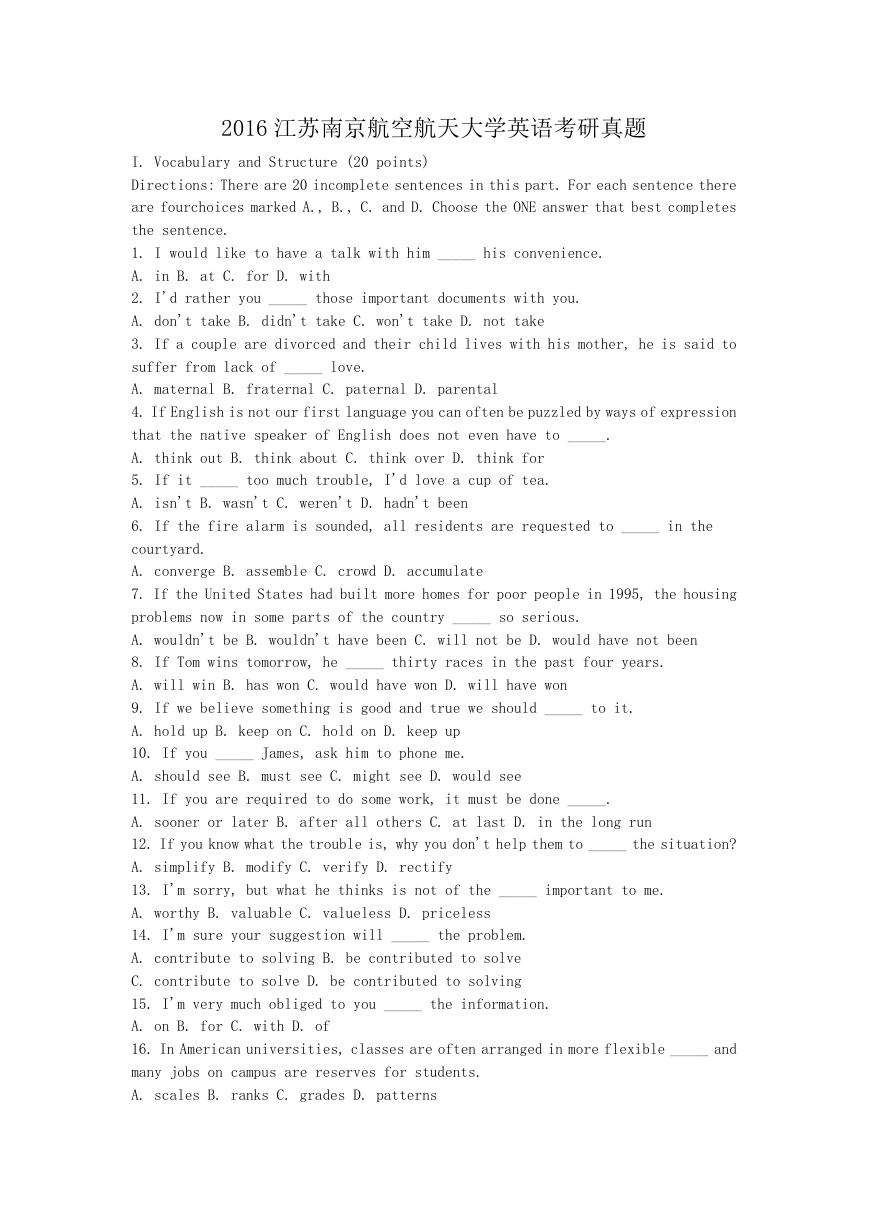

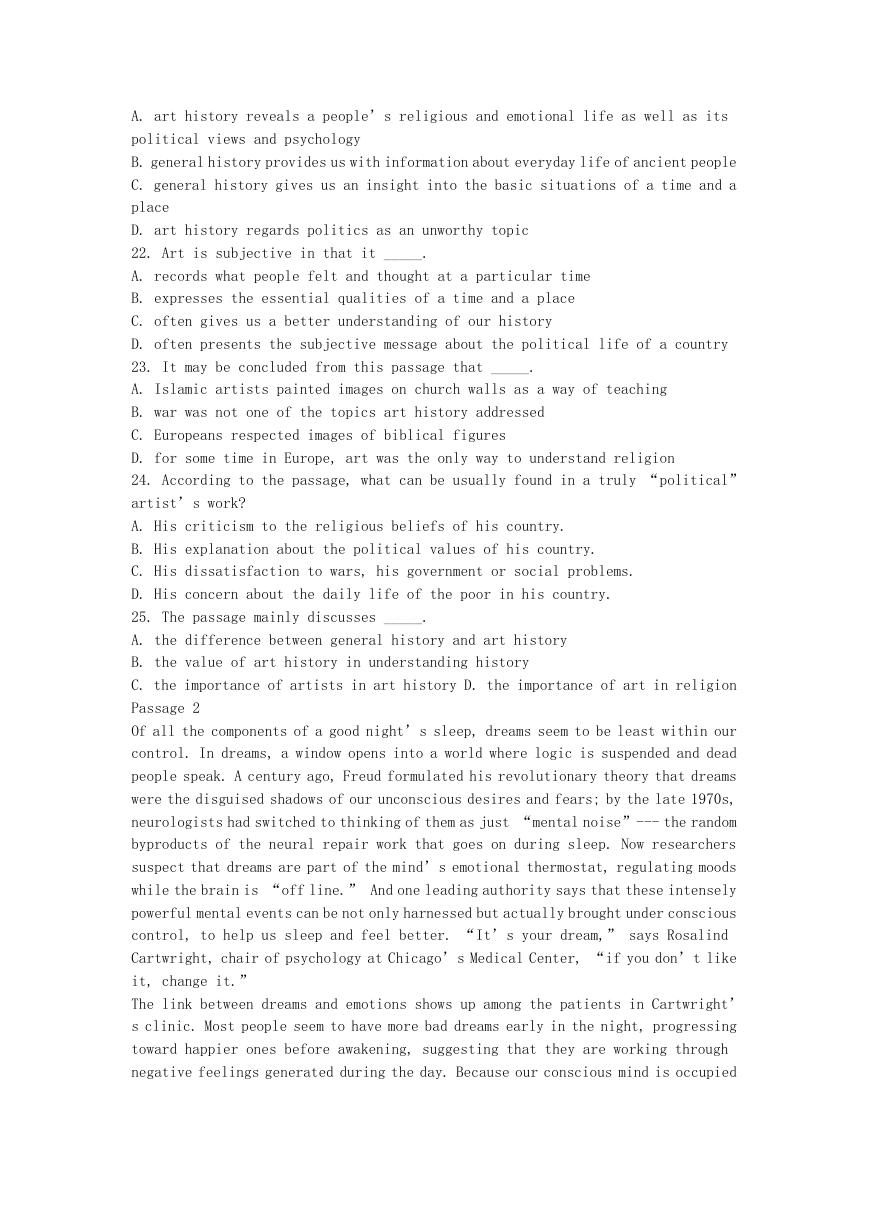
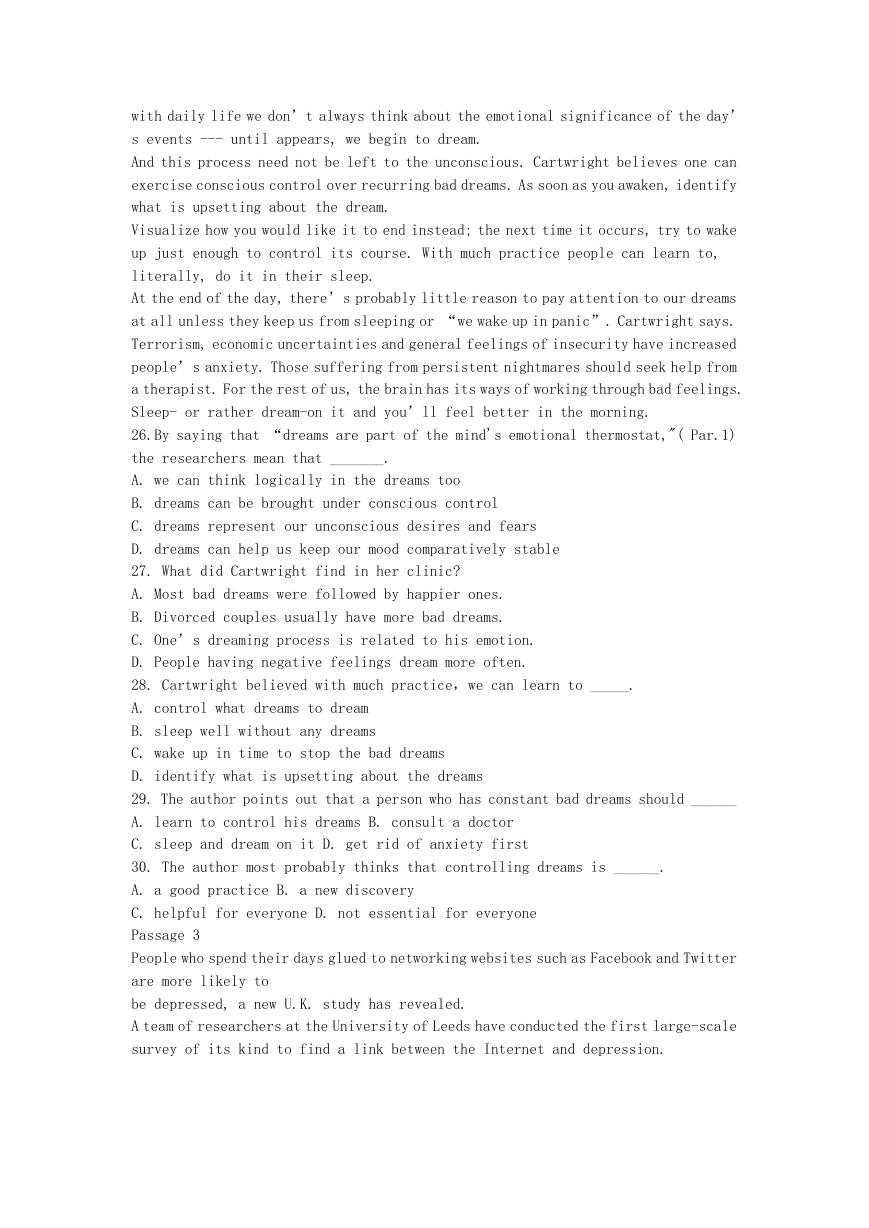
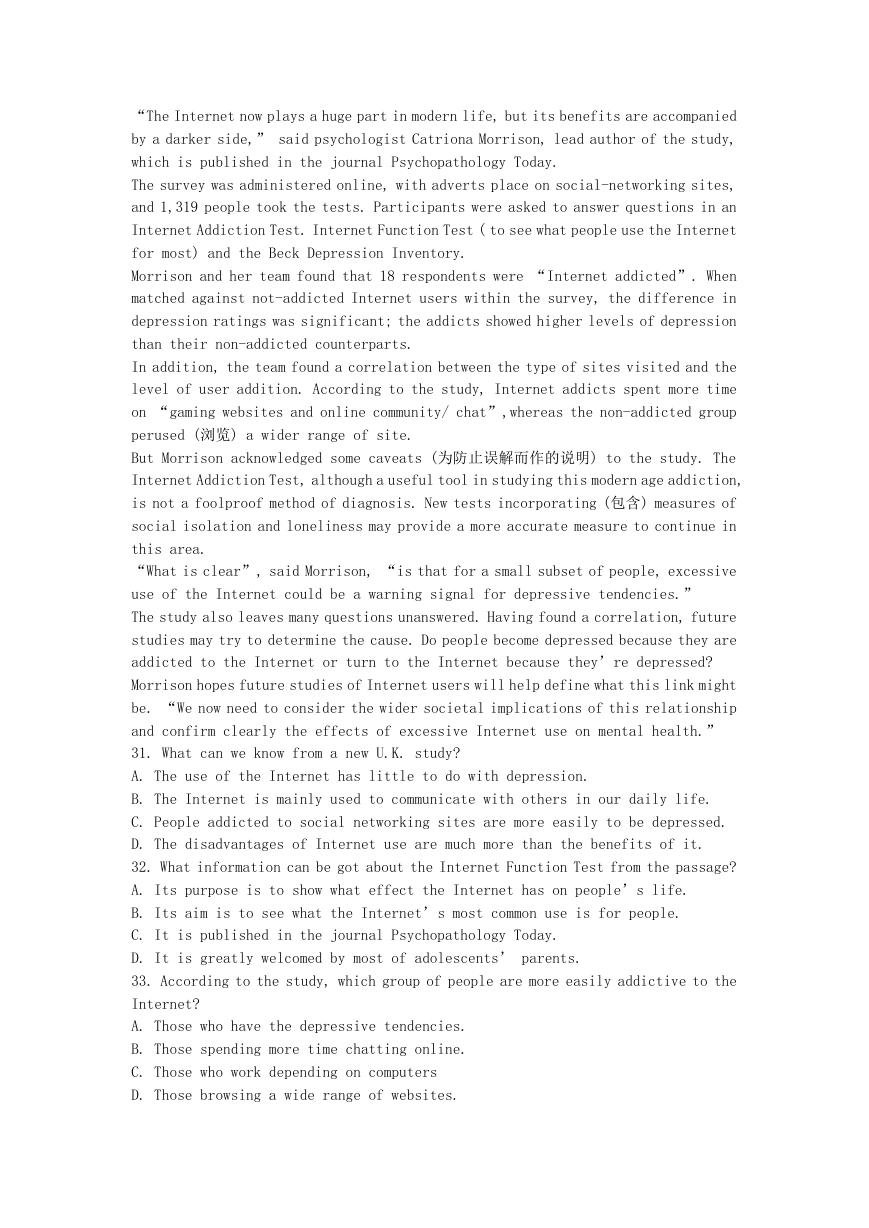
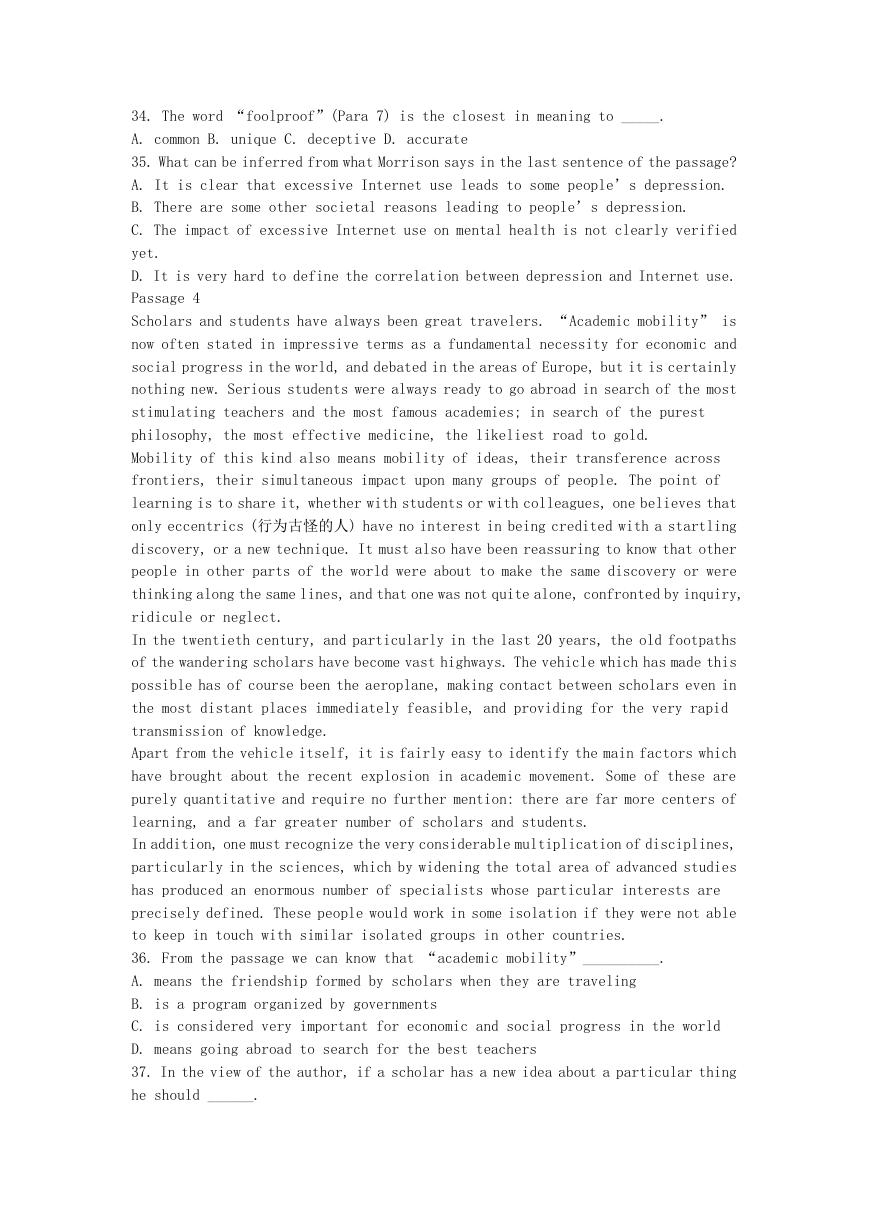
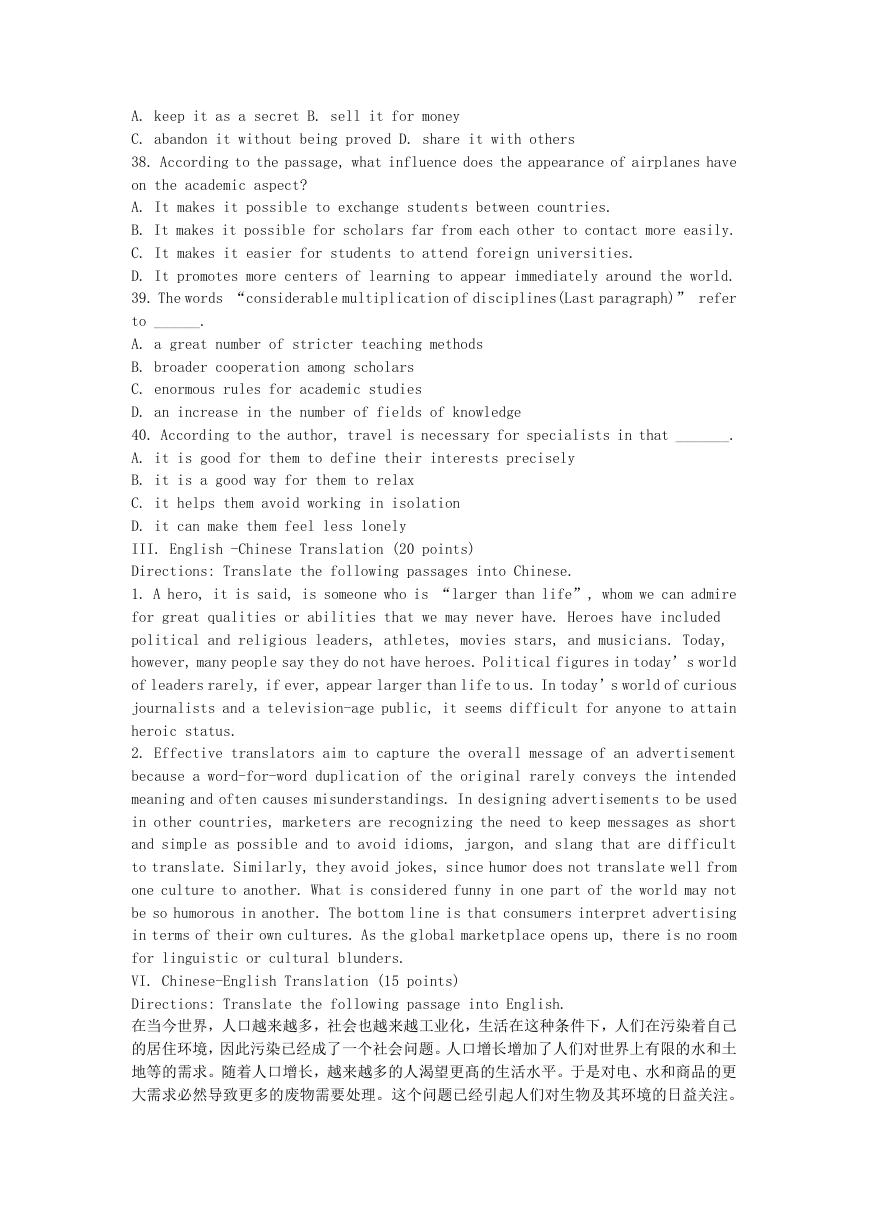









 2023年江西萍乡中考道德与法治真题及答案.doc
2023年江西萍乡中考道德与法治真题及答案.doc 2012年重庆南川中考生物真题及答案.doc
2012年重庆南川中考生物真题及答案.doc 2013年江西师范大学地理学综合及文艺理论基础考研真题.doc
2013年江西师范大学地理学综合及文艺理论基础考研真题.doc 2020年四川甘孜小升初语文真题及答案I卷.doc
2020年四川甘孜小升初语文真题及答案I卷.doc 2020年注册岩土工程师专业基础考试真题及答案.doc
2020年注册岩土工程师专业基础考试真题及答案.doc 2023-2024学年福建省厦门市九年级上学期数学月考试题及答案.doc
2023-2024学年福建省厦门市九年级上学期数学月考试题及答案.doc 2021-2022学年辽宁省沈阳市大东区九年级上学期语文期末试题及答案.doc
2021-2022学年辽宁省沈阳市大东区九年级上学期语文期末试题及答案.doc 2022-2023学年北京东城区初三第一学期物理期末试卷及答案.doc
2022-2023学年北京东城区初三第一学期物理期末试卷及答案.doc 2018上半年江西教师资格初中地理学科知识与教学能力真题及答案.doc
2018上半年江西教师资格初中地理学科知识与教学能力真题及答案.doc 2012年河北国家公务员申论考试真题及答案-省级.doc
2012年河北国家公务员申论考试真题及答案-省级.doc 2020-2021学年江苏省扬州市江都区邵樊片九年级上学期数学第一次质量检测试题及答案.doc
2020-2021学年江苏省扬州市江都区邵樊片九年级上学期数学第一次质量检测试题及答案.doc 2022下半年黑龙江教师资格证中学综合素质真题及答案.doc
2022下半年黑龙江教师资格证中学综合素质真题及答案.doc